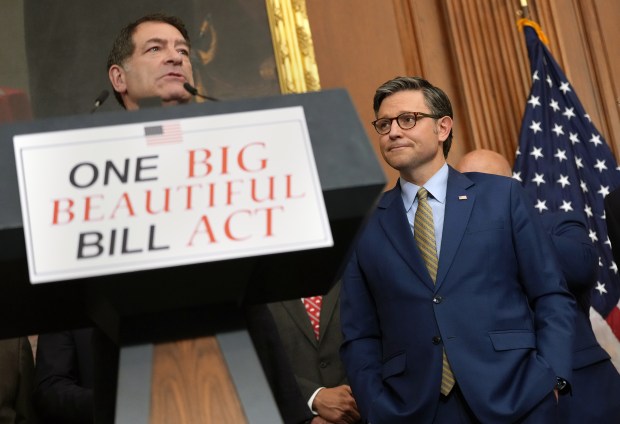Public schools are in crisis — not just in Chicago but also in Illinois and across the nation. Chicago Public Schools data obtained by WBEZ-FM 91.5 and Chalkbeat reveals a disturbing number of days missed by CPS students, adding to mounting evidence of systemic failure.
Blaming this trend on more lenient makeup policies and an easier path to graduation sanitizes the deeper truth: Schools have been systematically abandoning standards and accountability and returning to a culture of social promotion.
One might have expected that after COVID-19, school districts such as CPS would restore accountability systems. But that hasn’t happened — not for students, teachers or schools. The accountability pause, brought on by the prolonged, union-driven shutdowns of school campuses, has become a permanent feature. It’s now also reflected in widespread teacher absenteeism and inaction around failing schools.
In CPS, more than 40% of teachers were absent from their classrooms for 10 or more days during the 2023-24 school year, the Tribune Editorial Board noted last year. This threshold marks what experts define as “chronic absenteeism” among educators. Pre-COVID-19, that rate hovered around 31%. Meanwhile, CPS has not closed or consolidated even the most underenrolled or underperforming schools, nor has it reconstituted any failing ones.
Rather than raise standards, Illinois education officials recently proposed lowering the proficiency thresholds on state standardized tests. They argue current benchmarks are too high and fail to reflect true college and career readiness. “Our system unfairly mislabels students as ‘not proficient’ when other data — such as success in advanced coursework and enrollment in college — tell a very different story,” state schools Superintendent Tony Sanders said.
But this is just the latest maneuver in a broader state strategy to address abysmal academic outcomes by redefining success downward. Teachers unions and their allies oppose accountability. Their strategy is simple: Failure is easier to hide when the definition of success is diluted. This has disastrous consequences, particularly for low-income families.
CPS’ dismantling of its magnet school system is also part of this effort — designed to erase high-performing outliers and obscure disparities.
The Chicago Teachers Union has long opposed standardized testing. Under the now-abandoned School Quality Rating Policy, CPS once evaluated schools based on test scores. That’s gone — replaced by a system that decouples school ratings from academic outcomes.
The district has also weakened teaching standards. In 2023, 86.3% of CPS teachers were rated “excellent” or “proficient”; in 2024, it was 93.4%, according to Illinois Report Card data.
Families are responding by leaving. Between 2010 and 2021, Illinois lost more than 250,000 students — the second-highest decline in the country, after California, the right-leaning think tank Wirepoints reported last year. The erosion of standards, the lack of school choice and CPS’ extended COVID-19 shutdown have all contributed to this exodus.
To make matters worse, the state has taken steps to eliminate competition. It failed to renew the Invest in Kids tax credit scholarship program. Meanwhile, the CTU’s campaign to dismantle public alternatives such as charter and magnet schools is gaining ground. The abolition of the Illinois State Charter School Commission has allowed the CTU to pressure CPS into capping charter school numbers and enrollment.
What’s the recourse?
There is no substitute for raising standards — for students, teachers and schools. Assessments should certainly go beyond test scores and include other indicators of success, but alternative evidence must complement, not excuse, failure.
In my leadership roles across three of the nation’s largest school districts, I saw firsthand how embracing high standards — combined with expanding instructional time — dramatically improved test scores, graduation rates and attendance.
We must also empower local communities, through elected Local School Councils and principals, to control budgets and drive school-level reform. That includes the freedom to adopt better school models — whether traditional or private — and to consolidate underenrolled programs to expand opportunities. Parents, too, must have the right to choose the best school for their children — public, charter or private.
Finally, high schools need to evolve into career-connected learning centers. Whether college-bound or not, every student should participate in universal work-study programs. These initiatives build financial literacy, expose students to real-world environments and connect them with professionals serve as role models. Paid internships would serve as many students’ first jobs — helping them gain confidence and a sense of purpose.
Just as early college programs substitute for some high school coursework, work-study opportunities should replace low-value electives. The cost savings from offering fewer electives could fund student salaries in work placements. As a bonus, this would place students in safe, structured environments surrounded by adults committed to success.
Paul Vallas is an adviser for the Illinois Policy Institute. He ran against Johnson for Chicago mayor in 2023 and was previously budget director for the city and CEO of Chicago Public Schools.
Submit a letter, of no more than 400 words, to the editor here or email letters@chicagotribune.com.




